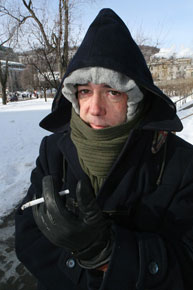Bourguignon Beat: Butting out at the MUHC
Bourguignon Beat: Butting out at the MUHC McGill University
User Tools (skip):
Bourguignon beat
Butting out at the MUHC
Weedless Wednesday and National Non-Smoking Week came and went unnoticed, like the forgotten birthday of an erstwhile loved one long ago cast aside.

Shivering in the cold for the sake of a nicotine fix has lost its lustre for our intrepid reporter.
Owen Egan
Brutal truth be told, people come and go, but to a smoker cigarettes are always there, a trusted friend to be counted on through thick and thin.
Anyone who has known me for any length of time knows me as a smoker, but that's about to change.
The friendship has lost its lustre.
It's now illegal to light up in bars or within nine metres of my own office door, and skulking in the shadows makes me feel as guilty as shivering in the cold to get my fix makes me feel stupid.
Something's gotta give, but I know I can't do it alone.
Luckily, the McGill University Health Centre offers a free smoking-cessation program through the Cancer Prevention Centre at the Mortimer B. Davis Jewish General Hospital.
The four-week program involves group therapy sessions twice a week, a sort of "Hi, my name is Michael and I'm a smoker" scenario augmented by the able advice and guidance of counselor Joseph Erban, himself a recovering smoker who has been "clean" for about three years.
At the first session last week, a small group of diehard—pardon the pun—smokers introduced themselves to each other and to Erban.
It's a fairly motley crew: besides myself, there's a septuagenarian who, after smoking for more years than I've been alive, is finally fed up with the smell of his own home and his inability to climb a flight of stairs without wheezing; a 60-something British gent lately contemplating his health and mortality; a young shift worker addicted as much to the social aspect of smoking as to the nicotine; and a career quitter who has taken the program before.
A healthier learned habit
"It often takes three to eight major attempts before successfully quitting," Erban said supportively, "though some people can do it in one try."
He provided further encouragement by citing the three-year-old program's comparatively high success rate: more than 40 percent of participants remain smoke-free a year after finishing the program.
The likelihood of accomplishing the same feat on one's own, he said, is roughly one percent. The odds seem to favour giving this MUHC service the old college try.
For the next few weeks, Erban will ply us with information, equip us with tricks and tools to ease the quitting process and reduce the risk of relapse, and generally give us the confidence we need to give it our best shot.
What he won't do is judge us the way some non- and ex-smokers seem entitled to do now that smoking is about as socially acceptable as clubbing kittens for sport.
Blame Olivia Newton-John
"I see smokers as victims," he told us, "because chances are you started young and couldn't possibly have made an informed decision (to take up the habit)."
As it turns out, for female smokers of a certain age, Olivia Newton-John is to blame.
Huh?
"The movie Grease made a lot of girls think it was OK to smoke," Erban explained.
I always figured Olivia Newton-John was largely to blame for leather pants, but now that I think about it, the idea that it's OK to get tarted up and take up smoking as a means of fitting in is a pretty unhealthy message for women of any age.
Any number of other movies could be cited as culprits, too.
Since smoking is a learned habit, Erban assured us that we can also learn to be non-smokers again - something I haven't been in a good 20 years. I've just turned 38 and would like to make it to 40 and beyond, so I think I'm ready. With your indulgence, I'll share the experience in the next issue of the Reporter.
Quit day is next Tuesday, Feb. 13, midway through the program.
You may still see me sneaking a puff now and again - at least until then - but this much I can promise: you'll never catch me in leather pants.
Michael Bourguignon, a communications officer and intrepid reporter in McGill's University Relations Office, regularly ventures into the University's lesser-known corners and classrooms to share offbeat experiences with Reporter readers.

